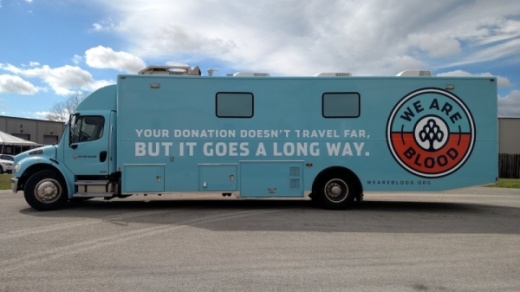Nine people have been murdered, and there was a string of high-profile stabbings. At a press conference last month, Austin Police Chief Brain Manley confirmed that violent crime, generally, was on the rise.
Meanwhile, the local health care system is expanding, with new specialty clinics, oncology treatment centers and satellite hospitals opening beyond the urban core.
Next month, visitors will descend on Austin for South by Southwest Conference & Festivals. Last year, nearly 74,000 people attended.
All these local stories affect the supply and demand for blood.
“Austin is in a unique growth position compared to a lot of other metropolitan areas,” said Nick Canedo, vice president of community engagement at local nonprofit We Are Blood. “So the increase in demand and the population growth that we’re experiencing are pretty unique and challenging.”
Since 1951, We Are Blood has served 10 counties in Central Texas. The organization needs to collect 200 blood donations each day to meet the inventory needs of the 40 area hospitals and clinics it serves, Canedo said.
Hospital systems, such as St. David’s, Dell Seton Medical Center at The University of Texas, Dell Children’s Medical Center of Central Texas and Baylor Scott & White, are rapidly expanding.
“The amount of treatments that people are receiving at these hospitals are increasing as well,” Candeo said.
Hospitals that offer cancer treatment or which are designated for maternal care have specific blood needs. Cancer patients who receive chemotherapy usually have low platelet counts, Canedo said, which drives demand for platelets.
Unlike a donation of red blood cells, which usually takes 15 minutes and can be stored for 42 days, platelets take longer to collect—usually between two to three hours—and have a shorter shelf life, just five days.
Hospitals with a maternal care designation must comply with state standards and American College of Obstetricians and Gynecologists assessments.
One requirement is that a certain amount of blood be on hand at all times, which We Are Blood must provide.
“All those things are really just adding into, not just the population growth and increase in accidents and patients, but the quality of care that we have in Central Texas, which is awesome because it means that people can receive care here in Austin rather than going to Houston or Dallas,” Canedo said. “But it just means that more blood donations are needed.”
We Are Blood collects about half of its supply through blood drives.
While demand for blood is pretty steady, supply is not always, Canedo said, adding that slow periods, such as the summer and holidays; inclement weather; and special events can impact donations.
“City events like South by Southwest cause an influx of visitors, which means even more people within our service area, but then, also, people—especially Austinites—tend to not go out as much during South by Southwest, so they’re not donating,” he said.
While We Are Blood can rely on a national network of blood donation centers and has helped those in need—such as centers in the Gulf Coast area after Hurricane Harvey and in Miami following the 2016 mass shooting at the Pulse nightclub—most deal with similar challenges.
We Are Blood sees about 30,000 unique donors each year, the majority of whom—60%—only visit once.
Regular donations are “critical,” Canedo said, and to encourage people to donate more regularly, the organization partners with local businesses on “thank-you” gifts, such as a voucher to Alamo Drafthouse or a P. Terry’s burger.
Additionally, We Are Blood is exploring whether to expand its mobile blood drive bus fleet and open a fourth donor center in addition to its Central Austin, South Austin and Round Rock locations.
“Making sure that we have a presence and are known in [suburbs such as] Round Rock, Pflugerville, Cedar Park, Leander—that’s the future, where the majority of people are living in Central Texas and where we need to find new donors,” Canedo said.




